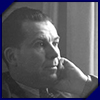- 1941
He composes the stage music for Lope de Vega’s play, Aimer sans savoir qui, which should have been directed by Jean Vilar but has never been performed.
He gives a lecture “Berlioz et les quatre Jeune France” at the théâtre des Mathurins.
Broadcast by R.T.F. on May 16th, of La Tentation dernière (Jeanne d’Arc), cantata based on a libretto by Claude Vermorel, part of a series by six other writters and six other composers.
Meetings with Claude Delvincourt, Georges Duhamel, Philippe Gaubert, Henri Ghéon, Jacques Rouché.
Collaboration with Arthur Honegger for his first film score, La Boxe.
- 1942
He receives a grant from the “Association pour la pensée française” which enables him to give up teaching.
Composes the Suite delphique.
He composes stage music for the Mistère de la Visitation by Henri Ghéon from which the Suite liturgique for voice, oboe, cello and harp will be taken.
He composes Dolorès ou le miracle de la femme laide, a one act opera-buffa with a libretto by Henri Ghéon, given in a studio performance in 1947 and staged in 1960.
First performance, in June, of the piano version of the Cinq danses rituelles by Lucette Descaves at the École normale de musique.
First recordings for gramophone (ballet scores).
- 1943
He writes a study of Beethoven.
He conducts the music of Arthur Honegger for performances of Paul Claudel’s Soulier de satin at the Comédie-Française.He composes the Suite delphqiue.
Birth of his second son, Merri.
- 1944
First performance of his ballet Guignol et Pandore at the Opéra de Paris (scenario and choreography by Serge Lifar, scenery and costumes by André Dignimont) :
“The main idea of Serge Lifar’s scenario which led me in the choice of musical elements of the score is the following : the traditional characters of Guignol are considered as human beings and the puppeteer himself is a puppet of wood and canvas… All music written for the theatre should above all serve the dramatic action. But there, as Boileau wrote “never stray away from what is natural”. And, perhaps, there is no better way than puppets to get closer to man, and to rediscover him ?”.First performance of the Cinq danses rituelles by the Société des concerts du Conservatoire conducted by André Cluytens.
Competition piece for the Paris Conservatory : Chant de Linos for flute and piano.
First publications by the Éditions Durand and Costallat. - 1945
On January 1st, André Jolivet is appointed Director of music at the Comédie-Française, a position that he holds until 1959. His attitude towards the musical tradition of the theatre of Molière is completely original. As far as Molière’s plays are concerned rather than compose new music, he will choose the music of Lully and rearrange them afresh. He will write five musical pieces for Molières’s plays : Le Malade imaginaire (1944), Les Précieuses ridicules (1949), Le Bourgeois gentilhomme (1951), Les Amants magnifiques (1954), L’Amour médecin (1955).
He also conducts the orchestra where Louis Dilliès, Lily Laskine, members of quatuor Parrenin, Jean-Pierre Rampal,… frequently play.He composes the first Sonate pour piano, and the two versions of the Sérénade pour hautbois ( with piano or with wind quintet).l.
- 1946
Fanfares pour Britannicus : first performance in Bruxelles by the Musique des Guides.
Travels to England with the Comédie-Française.
- 1947
First performance of the first Sonate pour piano par Yvette Grimaud à la Société nationale, on January 31st.
First performance of Psyché in Bruxelles conducted by Franz André, on May 5th..
First studio performance of Dolorès ou le Miracle de la femme laide conducted by the composer, at the R.T.F.. - 1948
Travel to Austria and Hungary : concerts and lectures in Vienna where he conducts the first performance of the Concerto pour ondes Martenot and the Suite delphique, as well as in Budapest.
He composes Hopi Snake Dance, dedicated to Darius Milhaud, which will be first performed in Tanglewood, USA.
- 1949
The publishers Heugel produce several scores.
He composes the Concerto pour flûte et orchestre à cordes which was performed the following year by Jean-Pierre Rampal and conducted by the composer.
- 1950
First performance in the Opéra de Paris of the ballet L’Inconnue on a theme of war and peace (scenario by Léandre Vaillat and choreography by Serge Lifar).
The ballet La Naissance de la Paix, on a text by Descartes, has never been completed.Journey to Egypt where he met the egyptologists of the École française du Caire : Alexandre Varille, Schwaller de Lubitsch, Étienne Drioton, de Stoppelaère. This stay in Egypt inspired Épithalame (of which certain poetic elements are taken from texts from Higher Egypt) and the second part of the First Symphony (Louqsor).
He writes the Concertino pour trompette which was not performed until June 1st 1950 at the Abbey of Royaumont under his direction.
The same year, he composes the Concerto pour piano (commissioned by the French Radio, under the title Equatoriales).
